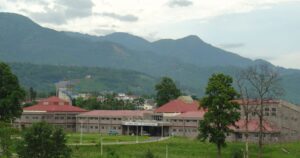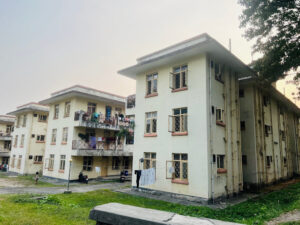- Leave a review
- Bookmark
- Share
- Report
- prev
- next
Description
B.P. Koirala Institute of Health Sciences
The B.P. Koirala Institute of Health Sciences (BPKIHS) is a premier medical institution located in Dharan, Nepal, named after the late Prime Minister of Nepal, Bishweshwar Prasad Koirala. Established in 1993, BPKIHS has emerged as a leading center for medical education, research, and healthcare services in Nepal and South Asia.

Academic Excellence: BPKIHS is recognized for its commitment to academic excellence and innovation in medical education. The institute offers undergraduate and postgraduate medical courses, including MBBS, MD/MS in various specialties, MDS, MSc Nursing, MPH, and PhD programs. The curriculum is designed to meet international standards and incorporates practical training to ensure comprehensive learning.
State-of-the-Art Infrastructure: The institute is equipped with modern facilities and infrastructure to support medical education and research. It has well-equipped laboratories, lecture halls, libraries, simulation centers, and specialized clinical departments. BPKIHS also operates a tertiary care hospital that serves as a teaching hospital for students and provides quality healthcare services to the community.
Research and Innovation: BPKIHS encourages research activities and innovation in healthcare. Faculty members and students actively engage in research projects addressing regional health challenges, contributing to the advancement of medical science and healthcare practices.
Community Outreach: As part of its mission to serve the community, BPKIHS conducts outreach programs and health camps in rural and underserved areas. These initiatives aim to promote health awareness, prevent diseases, and provide medical services to marginalized populations.
International Collaborations: BPKIHS collaborates with renowned international institutions and organizations to facilitate exchange programs, research partnerships, and capacity-building initiatives. This fosters global exposure and enriches the academic experience for students and faculty.
Focus on Public Health: The institute emphasizes public health initiatives and initiatives aimed at addressing prevalent health issues in Nepal. Through academic programs and community interventions, BPKIHS contributes to improving healthcare delivery and promoting public health outcomes.
Student-Centric Approach: BPKIHS adopts a student-centric approach, providing mentorship, career guidance, and support services to nurture the professional development of students. The institute fosters a conducive learning environment that encourages critical thinking, ethical practice, and lifelong learning.
In summary, B.P. Koirala Institute of Health Sciences is a distinguished medical institution committed to excellence in education, research, and healthcare. It plays a pivotal role in advancing medical science, addressing public health challenges, and producing skilled healthcare professionals who contribute to the well-being of society.
Quick Facts About B.P. Koirala Institute of Health Sciences (BPKIHS):
- Establishment and Upgradation:
- BPKIHS was established on January 18, 1993, and later upgraded to an autonomous Health Sciences University on October 28, 1998.
- Its mission is to develop a socially responsible and competent health workforce, provide healthcare services, and engage in innovative health research.
- Location:
- BPKIHS is located in the sub-metropolitan city of Dharan in Sunsari District, Nepal.
- Colleges and Programs:
- BPKIHS has four colleges: Medical, Dental, Nursing, and Public Health.
- It offers undergraduate, postgraduate, and PhD programs in various health disciplines.
- Central Teaching Hospital:
- The institute’s Central Teaching Hospital has 763 beds and well-established major clinical and basic sciences departments.
- Recognition:
- All MD, MS, MDS, MSc, and MPH degrees awarded by BPKIHS are recognized by the Nepal Medical Council and respective councils of Nepal.
- Some MD/MS degrees are also recognized by the Medical Council of India (MCI).
- Global Recognition:
- BPKIHS is listed in the World Directory of Medical Schools published by the World Health Organization (WHO).
BPKIHS stands as a prestigious center for biomedical research, education, and healthcare delivery, contributing significantly to Nepal’s health sector
Affiliation and Recognition of B.P. Koirala Institute of Health Sciences
- BPKIHS is recognized by various national and international bodies, including:
- Nepal Medical Council (NMC): BPKIHS is recognized and approved by the Nepal Medical Council, which regulates medical education and practice in Nepal.
- Medical Council of India (MCI): The MBBS degree awarded by BPKIHS is recognized by the Medical Council of India (MCI), allowing Indian students who graduate from BPKIHS to pursue further education or practice medicine in India after clearing the screening test conducted by MCI.
- World Health Organization (WHO): BPKIHS is listed in the World Directory of Medical Schools (WDOMS) maintained by WHO. This recognition signifies that the institute meets international standards for medical education and training.
- South Asian Association for Regional Cooperation (SAARC): BPKIHS is recognized as a leading medical institution in the SAARC region, contributing to collaborative efforts in healthcare and medical education among member countries.
Accreditation:
- B.P. Koirala Institute of Health Sciences is accredited by the Nepal Medical Council and meets the standards set by the regulatory authorities for medical education and healthcare services in Nepal.
International Collaborations:
- BPKIHS has established partnerships and collaborations with reputed international institutions and organizations in the field of healthcare and medical research. These collaborations enhance academic exchanges, research initiatives, and capacity-building programs.
B.P. Koirala Institute of Health Sciences enjoys recognition and accreditation from national and international bodies, ensuring that its medical programs meet stringent quality standards and prepare students for successful careers in healthcare both in Nepal and globally. Prospective students seeking admission to BPKIHS can be assured of receiving a recognized and reputable medical education that aligns with international best practices in medical training and research.
Advantages of Study MBBS at B.P. Koirala Institute of Health Sciences:
Studying at B.P. Koirala Institute of Health Sciences (BPKIHS) offers several advantages for aspiring medical students:
- Globally Recognized Institution:
- BPKIHS is recognized by international organizations such as the World Health Organization (WHO), the Medical Council of India (MCI), and the Medical Council of Nepal.
- Graduates receive a globally approved MBBS degree.
- English Language Education:
- BPKIHS provides education in English, making it accessible for international students.
- The medium of instruction ensures that students can comfortably follow their coursework.
- Quality Education at an Affordable Cost:
- BPKIHS offers high-quality medical education at a reasonable tuition fee.
- Students can pursue their MBBS studies without excessive financial burden.
- Experienced Faculty:
- The institute boasts a faculty with extensive experience, ensuring top-quality education.
- Professors and teachers are dedicated to providing the best learning experience.
- Better Accommodations for Foreign Students:
- BPKIHS provides excellent accommodations tailored for the convenience of foreign students.
- Comfortable living arrangements contribute to a conducive learning environment.
- Opportunities for Innovation:
- BPKIHS encourages innovation and research, allowing students to explore new ideas and contribute to healthcare advancements.
B.P. Koirala Institute of Health Sciences offers a globally recognized MBBS program, quality education, and a supportive environment for aspiring medical professionals
Why Choose Nepal For MBBS?
Studying MBBS in Nepal offers several advantages for aspiring medical students. Let’s explore some of the key benefits:
- Quality Education: Nepal has reputable medical universities that provide high-quality education. These institutions follow international standards and have experienced faculty members.
- Affordability: The tuition fees for MBBS in Nepal are affordable, making it an attractive option for students seeking quality education without excessive financial burden11.
- Global Recognition: Nepali medical degrees are recognized by organizations such as the World Health Organization (WHO) and the National Medical Council (NMC). Graduates can practice medicine worldwide.
- NMC-Approved Universities: Nepal has NMC-accredited medical universities, which is advantageous for Indian students. The curriculum is similar to that in India, making it easier to pass the NMC screening test.
- Cultural Immersion: Studying in Nepal provides a unique cultural experience. Students can explore Nepal’s rich heritage, traditions, and natural beauty.
- Clinical Exposure: Nepali medical colleges offer extensive clinical exposure through affiliated hospitals. This hands-on training enhances students’ practical skills.
- Multicultural Environment: Nepal’s diverse population ensures a multicultural learning environment, fostering cultural understanding and broadening perspectives.
Studying MBBS in Nepal provides numerous advantages, including high-quality education, affordability, global recognition, extensive clinical exposure, cultural immersion, and multicultural experiences.
Eligibility
Eligibility Criteria for MBBS Admission at B.P. Koirala Institute of Health Sciences:
- Age Requirement:
- Candidates must have completed 17 years of age by 31st July of the year of admission.
- Educational Qualification:
- Completion of 10+2 education or equivalent from a recognized board.
- Subjects studied must include Physics, Chemistry, Biology (or Biotechnology), and English.
- NEET UG Score:
- Qualified NEET UG examination conducted by the National Testing Agency (NTA) with the minimum required percentile as per MCI guidelines.
- Documents Required:
- Valid Indian passport with a minimum of 18 months validity.
- Mark sheets and certificates of 10th and 12th standard.
- Birth certificate as proof of age.
- Ten passport-size photographs.
Admission Process at B.P. Koirala Institute of Health Sciences:
- Application Submission:
- Complete the application form and submit it along with the required documents to BPKIHS.
- Entrance Examination:
- Applicants will need to appear for an entrance examination conducted by BPKIHS as part of the admission process.
- Personal Interview:
- Shortlisted candidates based on the entrance exam performance will be called for a personal interview.
- Provisional Admission Offer:
- Upon successful completion of the interview and meeting all eligibility criteria, selected candidates will receive a provisional admission offer from BPKIHS.
Note: Education Zone will help and guide you at every step for your Admission at The European University ! kindly Contact us For more info. replace Kathmandu Medical University to B.P. Koirala Institute of Health Sciences.

Fees structure
Hostel
- Hostels:
- BPKIHS offers separate hostels for boys and girls within the college campus.
- Staying in the hostel is mandatory for all BPKIHS students.
- The hostels are well-furnished and provide a comfortable living environment.
- Mess Facilities:
- The hostels have an attached mess where students can have their meals.
- The mess provides hygienic and clean food, with options for both vegetarian and non-vegetarian meals.
- Other On-Campus Facilities:
- Spacious lecture halls for academic sessions.
- Well-equipped museums for practical learning.
- Auditorium for events and seminars.
- Central Library with a vast collection of reference materials.
- Demonstration rooms and dissection halls for medical practicals.
- Modernized computer labs with internet connectivity.
- Sports complex and playground for recreational activities.
- Nearby Amenities:
- BPKIHS is conveniently located near ATMs, railway station (approximately 10 km away), bus stand, and airport.
- These facilities make it feasible for students to commute to and from the college area.
B.P. Koirala Institute of Health Sciences (BPKIHS) offers hostel facilities and accommodation options to its students, ensuring a conducive living environment on campus. Here's a detailed look at the hostel facilities and accommodations provided:
Hostel Facilities:
- Well-Maintained Rooms:
- BPKIHS provides well-maintained and furnished rooms for students, offering both single and shared accommodation options.
- 24/7 Security:
- The hostel premises are equipped with security personnel and surveillance systems to ensure the safety and security of students.
- Internet Connectivity:
- Wi-Fi access is available within the hostel premises, allowing students to stay connected and access online resources.
- Common Areas:
- Common areas such as lounges, recreation rooms, and study rooms are available for students to relax, socialize, or engage in academic activities.
- Dining Hall:
- The hostel has a mess or dining hall serving nutritious meals for students, including breakfast, lunch, and dinner.
- Laundry Services:
- On-site laundry facilities or services are available for students' convenience.
- Medical Facilities:
- Basic medical facilities and first-aid services are provided within the hostel premises.
Accommodation Options:
- Single and Shared Rooms:
- BPKIHS offers both single occupancy and shared accommodation options based on student preferences.
- Separate Hostels:
- Separate hostel buildings are available for male and female students, ensuring gender-specific accommodation and privacy.
Other Facilities and Services:
- Recreational Facilities:
- The institute may organize recreational activities, cultural events, or sports tournaments within the hostel premises.
- Study Areas:
- Quiet study areas or study rooms are designated within the hostel for students to focus on their academic pursuits.
- Proximity to College:
- Hostel buildings are located in close proximity to the BPKIHS campus, providing easy access to academic facilities and classrooms.
- Community Engagement:
- BPKIHS encourages community engagement and social activities among hostel residents, fostering a sense of community and camaraderie.
BPKIHS strives for excellence in education, service, and research, ensuring holistic development and top-tier healthcare services for its students and the community




